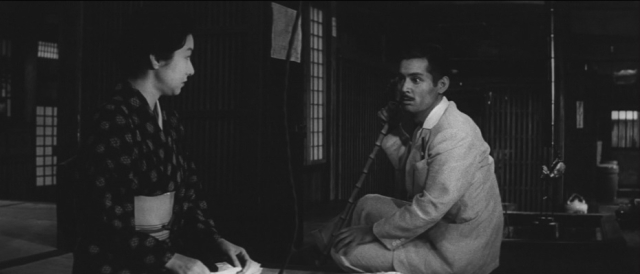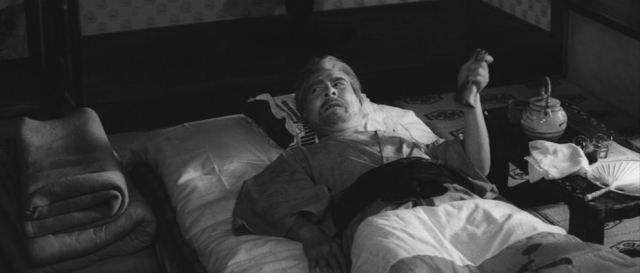
Any viewer who goes into Keisuke Kinoshita’s 1961 film Immortal Love expecting the grand, sweeping romance suggested by the title is bound to be disappointed. The original Japanese title, Eien no hito (永遠の人), can be translated as “forever one,” which is a bit closer to the mark, as the focus is on a marriage — if something so ugly and venomous can truly be regarded as a marriage. Perhaps the other English name given to the film is the most appropriate of all: Bitter Spirit.
The story, which spans nearly thirty years, begins in 1932, at the time of the Sino-Japanese military conflict known as the Shanghai incident. Heibei Koshimizu (Tatsuya Nakadai), the son of a wealthy landowner (Yasushi Nagata), is returning to his home in rural Japan after suffering a leg wound in battle, an injury that will cause him to limp for the rest of his life. The unsuspecting viewer — the same one expecting a great romance, maybe — might assume that Heibei will be a sympathetic figure as a consequence of his disability; if so, the unsuspecting viewer would be entirely mistaken.

Upon his arrival at home, Heibei takes note of a young woman named Sadako (Hideko Takamine), the daughter of a tenant farmer (Yoshi Katô). “Sadako has become quite pretty,” he remarks. When he learns that she’s in love with a local man named Takashi (Keiji Sada), who has yet to return from his own military service in China, his interest becomes an obsession. It emerges that the upstanding Takashi was held up to Heibei as an example to follow throughout his childhood, and he continues to resent him for it. “My parents used to scold me like that. What an annoying fellow he was! I hated him.” The thought that Takashi will now get to marry Sadako is too much for him to bear — and so he attempts to rape her while she’s massaging his bad leg (a task befitting her inferior social status, not a favor done out of fondness for him), though she manages to escape.
His father witnesses the aftermath of this scene and is appalled — not, like any decent person, because of what his son attempted to do, but because he failed to accomplish it. “How pathetic!” he scoffs. “The men of Koshimizu have always been village chiefs here. Can’t you even control a tenant farmer’s daughter? Be a man!” Suddenly, it’s not difficult to understand why Heibei is the way he is. While it isn’t clear whether there’s a dig at his physical handicap implicit in this reproof, undoubtedly Heibei sees it that way; anything to support his view of himself as a victim. “You’re the cruel one. You hate me because of my limp,” he tells Sadako just before he attacks her a second time — “successfully,” on this occasion. Between this and his father’s threats to take land away from both Takashi’s brother (Kiyoshi Nonomura) and Sadako’s father, she finds herself forced to marry him. She doesn’t submit without a struggle: first she tries to drown herself but is rescued, and then she and the newly returned Takashi make plans to run away together before the wedding, only to have him back out at the last minute in the belief that he can only give her a life “full of hardships.”

Sadako may be elevated socially and financially through her marriage into the Koshimizu family, yet it’s difficult to imagine that a life of poverty with Takashi could entail half as many hardships as life with Heibei. Heibei is, in short, a monster — the inevitable product of his upbringing and culture, possibly, but a monster nonetheless. In addition to furiously beating Sadako on at least one occasion, he constantly insults her and blames every problem on her, never acknowledging or recognizing the far-reaching damage caused by his own actions. He appears to delight in psychological cruelty, like when, during World War II, he hires Takashi’s wife, Tomoko (Nobuko Otowa), to work as a maid in the Koshimizus’ home. “Just imagine how Takashi would feel. Both his old love and his wife will be under my keep,” he laughs to himself. “You’re despicable,” Sadako replies. He soon confirms this by, first, telling Tomoko about Sadako and Takashi’s history (painting himself and Tomoko as victims tormented by their unloving spouses) and later by attempting to sexually assault her. “Takashi has stolen my wife. I’ll steal his,” he says.
Oddly enough, especially considering her own experiences, Sadako chastises both Heibei and Tomoko for this when she walks in and finds Tomoko fleeing the house, even going so far as to slap the other woman. “You’re Takashi’s wife!” she cries before turning to her own grinning, unrepentant husband and saying, “You beast!” Still, she’s a highly sympathetic character on the whole, and it’s impossible not to pity her, trapped as she is in a miserable, even hellish existence. Along with Heibei, she also has to deal with his horrible father, who becomes bedridden and incessantly demands Sadako’s help by ringing a bell (which he throws at her at one point), and with troubled, troublesome, violence-prone eldest child Eiichi (Masakazu Tamura) — a son she finds herself unable to warm to because he was the product of the rape that led to her marriage. (He’s Heibei’s favorite, of course, and Heibei doesn’t care one bit if his other two children know that.) All in all, her lot in life is a grim one.

And then, in a bizarre turn of events, Sadako herself becomes the target of censure. It’s strange enough when middle child Morito (Masaya Totsuka), by this point an adult, tells her, “Until you forgive Father, I won’t forgive you either,” though that can be explained reasonably: he might see her lack of affection for Eiichi as the sole cause of an earlier family tragedy, unjust and myopic though that interpretation would be. However, immediately thereafter, the flamenco band (yes, really) that provides musical transitions from one time period to the next castigates her in song:
Long, long ago, a woman became a demon
That was because
She married a man she disliked and bore his children
As a result
Her husband and children became victims
Of her fiery flames
If this bore any resemblance to what the viewer has seen of Sadako, it could be psychologically credible character development in light of her situation — but it doesn’t. Although she sometimes says harsh things to Heibei, they’re certainly never more than he deserves, and he provokes her (intentionally, it often seems) into saying them through his own words and actions. As for the children, there’s a lot of talk about her difficulty in loving Eiichi, yet she’s only seen scolding him when he makes little sister Naoko (Yukiko Fuji) cry and, more severely (with a slap and the declaration that she’s washed her hands of him), when she learns that he’s beaten up one of his friends at school — and not for the first time. She’s not perfect, but the idea that she should be regarded as a demon is baffling.

In fact, that condemnatory verse sounds more like Heibei’s view of his wife than something backed up by hard evidence, almost as if he wrote it himself. There’s precious little, if anything, to indicate that the song is supposed to be read in this sort of postmodern manner, yet the concept of people in power — Heibei and his ancestors, in this case — rewriting history to make themselves look better does come up several times throughout the film. Later on, for example, in an unusually soft and sentimental mood, he tells Sadako that “as I yelled at you and hit you, all I wanted was you, only you” and that “what I did to you was immoral, but my feelings for you were sincere.” She, disgusted, doesn’t buy a word of it. “You’re lying. You made all that up to beautify the past,” she says.
There’s also the local legend of the “mound of one thousand,” associated with the Koshimizus. According to family lore, chests of gold coins are buried beneath it; in reality, it’s the grave of massacred farmers who died in a failed revolt because they were betrayed by a Koshimizu, generations back, whose forest land subsequently thrived thanks to the human remains in the soil. “Our family prospered on their blood,” concludes Morito. Because of this, there’s said to be a curse on the family; Heibei’s bad leg and his father’s are both attributed to it by the villagers.

Unlikely though an actual curse may be, it’s evident that there’s something seriously wrong with this family, something deeper and even more debilitating than their physical issues, which could be viewed as symbolic manifestations of their inner corruption. It’s fitting that Heibei receives his injury during an imperialistic campaign, because the Koshimizus embody so many qualities associated with imperialism: power, arrogance, violence, masculinity of the worst kind. (Extending this parallel, family and nation alike lose land after World War II.) They abuse women, who are no more than objects to them, things to be possessed and controlled; they take advantage of the poor for personal gain.
In the end, Bitter Spirit seems a far more fitting title than Immortal Love, unless the latter either refers to Sadako and Takashi or is read sarcastically. The question, then: who or what is this spirit? Is it Sadako, the alleged demon, who certainly has reason to be bitter? Is it Heibei? Is it the curse or congenital taint of sorts that runs in generation after generation of the Koshimizu family? Maybe it doesn’t need to be pinned down; the spirit permeates the film. Even in the final minutes, when there’s a slight glimmer of hope, a chance of possible redemption, Heibei says bluntly, “You and I may never be reconciled until one of us dies. Then that’s our destiny.” Bitter, indeed.
This post is part of the 2nd Disability in Film Blogathon, hosted by Pop Culture Reverie and In the Good Old Days of Classic Hollywood. Click the banner above to see all of the other great posts.


Pingback: THE DISABILITY IN FILM BLOGATHON IS HERE – In The Good Old Days Of Classic Hollywood.
How have I never heard of this before!? Sounds well worth a watch. Thanks for bringing this my attention with your brilliant review, Erin.
LikeLiked by 1 person
You’re welcome, and thank you! It’s not an easy or pleasant watch by any means, but it’s fascinating, and the performances are great.
LikeLike
Sounds rather interesting, I should give it a shot. Your connection between imperialism and behaviour of the husband is more than valid in my opinion. The part concerning the construction of a demonic wife in a song seems as a sign of another sadistic escapade. “War will make corpses of us all.” seems to fit this movie
LikeLiked by 1 person
Thanks! Yes, those are good points.
LikeLiked by 1 person
Pingback: The 2nd Disability in Film Blogathon is Here! | Pop Culture Reverie
Excellent analysis. I found your discussion of imperialism interesting. Not having seen the film, I can’t be sure that my reading is supported by the film, but based on your piece, it might be that the injuries of the Koshimizus suggest inherent weakness in the imperialist design.
LikeLiked by 1 person
Thank you! I think that’s definitely a valid reading.
LikeLike